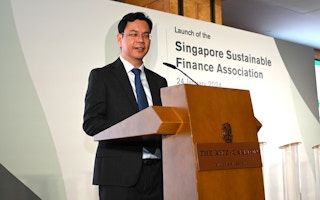As new disclosure regulations and sustainability standards kick in, upskilling of the financial sector’s workforce will be needed, said Singapore’s newly-minted central bank head Chia Der Jiun.
To continue reading, subscribe to Eco‑Business.
There's something for everyone. We offer a range of subscription plans.
- Access our stories and receive our Insights Weekly newsletter with the free EB Member plan.
- Unlock unlimited access to our content and archive with EB Circle.
- Publish your content with EB Premium.
In his maiden speech as managing director of the Monetary Authority of Singapore (MAS), Chia said that preliminary findings from a new study by the national accreditation and certification agency for the financial industry suggest that most of the jobs in the sector must be “augmented through upskilling” to better serve clients, given the rapid changes in regulations, products and processes. The study was conducted by the Institute of Banking and Finance, in partnership with statutory board Workforce Singapore.
“New and highly specialised roles such as sustainability risk analysts will be created,” he said, adding that detailed findings and initiatives to support the growth of these identified roles will be shared later in April.
Chia succeeded Ravi Menon, who was the country’s longest-serving central bank chief, on 1 January. He was speaking at the launch of Singapore Sustainable Finance Association (SSFA) on Wednesday.
A cross-sector industry body, the SSFA aims to strengthen Singapore’s sustainable finance ecosystem. It will help to develop capacity building initiatives such as sustainable finance courses, including those offered by institutes of higher learning.
Key areas of focus under its workplan include carbon markets, transition finance, blended finance, natural capital and biodiversity, as well as taxonomy.
SSFA builds on the work of the Green Finance Industry Taskforce (GFIT), which was convened by the MAS in 2019 and concluded in 2023.
In the past three years, GFIT has rolled out several initiatives, including the issuance of a practical guidance on environmental risk management for the industry, implementation guides for climate disclosures, and most notably, developing the world’s first multi-sector taxonomy defining “transition” activities.
“It was agreed that GFIT’s good work should continue via a permanent body and not a temporary task force,” said Wong Kee Joo, chief executive officer of HSBC Singapore and co-chair of SSFA.
What differentiates SSFA from other sustainable finance initiatives in Singapore, Wong said, is the emphasis on bridging the financial sector and the real economy, enhancing the city-state’s competitiveness as a sustainable finance hub and being outward-looking as it seeks to collaborate with other jurisdictions to mobilise sustainable investments.
Deborah Ho, country head of Singapore and regional head of Southeast Asia, BlackRock, who also co-chairs SSFA, said: “We see clients increasingly interested in a whole-of-ecosystem approach as countries, companies and investors navigate the low-carbon transition.”
“We’ve heard a lot about partnerships at COP [the annual United Nations global climate summit], but one untapped opportunity we saw for the industry was a unifying platform which brings everyone together; bridging the financial sector and the real economy and bringing together the public and private sectors,” she said.
SSFA director Kavita Menon added that she would like more hard-to-abate companies to join as members.
The central bank’s intention to set up SSFA together with the financial sector was first announced last June by MAS chairman Tharman Shanmugaratnam. The Association of Banks in Singapore is leading the coordination and setting up of SSFA.
SSFA will be governed by an executive committee comprising 21 C-suite representatives from financial institutions, government agencies and corporations. Apart from BlackRock, HSBC, MAS and ABS, the committee includes life insurer AIA, Singapore Exchange (SGX), all three major local banks DBS, OCBC and UOB, and Singapore-based carbon trading platform Climate Impact X.
The association will also work in partnership with industry associations and academic institutions.
Over S$30 billion (US$22.4 billion) worth of green, social, sustainability and sustainability-linked (GSSS) bonds and loans were issued in Singapore last year. While this makes it Southeast Asia’s largest market for such bonds and loans, it pales in comparison to the country’s key competitor Hong Kong, which issued US$80.5 billion worth of GSSS-themed debt in 2022.








